

Tracking...so what? 7 things we know you're going to say. 1.
I've got nothing to hide Whether you have something to hide or not is totally irrelevant. Privacy is not about hiding - it is about autonomy, power and control; it is about your ability to decide how you present yourself to the world. Given how much data about you is constantly being collected, mostly in ways that you can't see, this erosion of your privacy can't help but have an impact in the long run - on your job or on future jobs; on your networks; on how much you end up paying for specific products; and on a range of other things. 2. Not all digital traces are important and no, maybe what you eat for breakfast doesn't matter. But when you look carefully at the digital traces you create, you'll find a mix: some might be very banal (your breakfast), but others might be much more personal - where you go (which can also show what you're doing, and with whom), or what your health concerns are. 3.
Looking for a job or applying for credit? Still think it's 'just the internet? ' 4. 5. 6. How to Audit a Student's Online Presence. This post is an excerpt from our Digital Citizenship Conference event in Los Angeles.
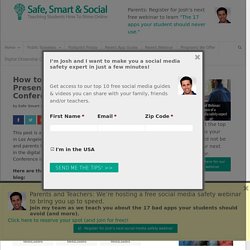
The conference was a rich environment for educators and parents to openly discuss issues and solutions for helping students in the digital world. All of the content from the Digital Citizenship Conference is available as a Virtual Replay Ticket. Here are the online safety experts who contributed to this blog: Josh OchsFounderSafeSmartSocial & MediaLeaders Amy PobleteManager & Conference Dir.SafeSmartSocial & MediaLeaders Elisa JohnsonContent Marketing ManagerSafeSmartSocial & MediaLeaders In this panel discussion, experts share their best tactical tips for auditing a student’s online presence. Digital Citizenship. Even 'Digital Natives' Need Digital Training. Published Online: October 20, 2015 Published in Print: October 21, 2015, as Digital Citizenship Matters for All Ages Commentary By Erin McNeill Imagine a 5th grade sleepover party where, inevitably, someone gets left out.
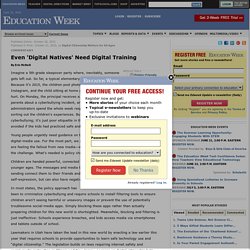
So far, a typical elementary school experience. Young people urgently need guidance on thoughtful, ethical, and responsible digital-media use. Children are handed powerful, connected devices by parents and schools at younger and younger ages. —Getty In most states, the policy approach has been to criminalize cyberbullying and require schools to install filtering tools to ensure children aren't seeing harmful or unsavory images or prevent the use of potentially troublesome social-media apps. Lines on Plagiarism Blur for Students in the Digital Age. “Now we have a whole generation of students who’ve grown up with information that just seems to be hanging out there in cyberspace and doesn’t seem to have an author,” said Teresa Fishman, director of the Center for Academic Integrity at Clemson University.
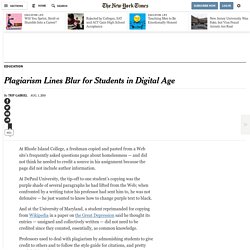
“It’s possible to believe this information is just out there for anyone to take.” Professors who have studied plagiarism do not try to excuse it — many are champions of academic honesty on their campuses — but rather try to understand why it is so widespread. In surveys from 2006 to 2010 by Donald L. McCabe, a co-founder of the Center for Academic Integrity and a business professor at Rutgers University, about 40 percent of 14,000 undergraduates admitted to copying a few sentences in written assignments. Perhaps more significant, the number who believed that copying from the Web constitutes “serious cheating” is declining — to 29 percent on average in recent surveys from 34 percent earlier in the decade.
Ms. Photo Ms. In the view of Ms. Add student voice to digital citizenship with PBL. If off-the-charts student engagement, increased problem-solving skills and deep learning are the hallmarks of project-based learning, perhaps it’s time we applied the approach to another hot education topic: digital citizenship.
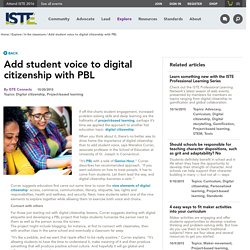
When you think about it, there’s no better way to drive home the importance of digital citizenship than to add student voice, says Marialice Curran, associate professor in the School of Education at University of St. Joseph in Connecticut. “It’s PBL with a side of Genius Hour,” Curran describes her recommended approach. “If you want solutions on how to treat people, it has to come from students. Let them lead the way, and digital citizenship becomes a verb.”
Curran suggests educators first carve out some time to cover the nine elements of digital citizenship: access, commerce, communication, literacy, etiquette, law, rights and responsibilities, health and wellness, and security. Connect with others. InCtrl. Essential elements of digital citizenship. Internet Safety Education: 10 Questions Parents Should Be Asking. Last week a school near me suffered a social media mishap involving its students.
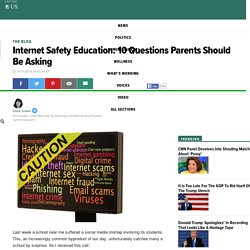
This, an increasingly common byproduct of our day, unfortunately catches many a school by surprise. 10 steps technology directors can take to stay relevant SmartBlogs. The role of the typical school district technology director has become obsolete.
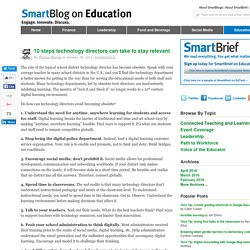
Speak with your average teacher in many school districts in the U.S., and you’ll find the technology department is better known for getting in the way than for serving the educational needs of both staff and students. Many technology departments, led by obsolete tech directors, are inadvertently inhibiting learning. The mantra of “lock it and block it” no longer works in a 21st century digital learning environment.
Using edtech to create digital citizens.